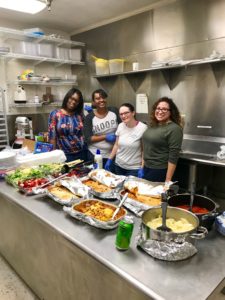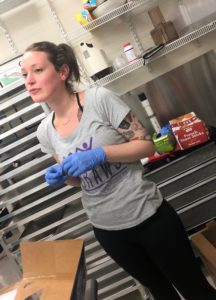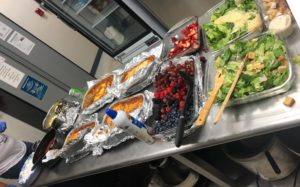UPICares Serves Dinner at HER Shelter
By Jessica Lay
Nov. 16, 2018
Earlier this month, five members of the UPICares team served dinner to 12 women and nine children seeking refuge at the Help and Emergency Response (HER) Shelter. HER Shelter provides basic assistance and aims to promote healing and empowerment to those affected by domestic violence. The dinner was the first out of our Norfolk, Va., office and marked the beginning of 2018’s Hunger and Homelessness Awareness Week.

Team members Nikita, Amina, Jessica B., and Ana ready to serve dinner to shelter clients.
According to the Salvation Army, six percent of homelessness cases in the U.S. are caused by domestic violence. The National Alliance to End Homelessness reported that on a single night in January 2017, 16 percent of the overall homeless population (87,329 people) had experienced domestic violence. Survivors often need to leave home very quickly, sometimes with children or pets. This means that they must go without simple necessities like a change of clothes, food, or money.
According to the National Center on Domestic and Sexual Violence (NCDSV), the cycle of abuse starts with mounting tension, then a violent incident, and ends with a calm stage when the abuser might apologize profusely or even deny they did anything wrong at all. But not all abuse is physically violent. Abusers find many ways to control their partners.
Defining Domestic Violence
Domestic violence, also known as intimate partner violence (IPV), can manifest in several ways, such as controlling behavior, physical or sexual violence, withholding or hiding money and resources, emotional or verbal abuse, stalking, and isolation. Signs of domestic abuse can include:
- Fear of your partner or feeling threatened
- Feeling like you walk on eggshells or anxiety over potential reactions from your partner
- Feeling belittled or humiliated
- Having your possessions withheld or destroyed
- Having limited access to the phone, car, or finances
Abuse can happen to people of all ages, gender identities, and socioeconomic status. NCADV reports one in three women and one in four men have been victims of domestic violence at some point. IPV disproportionately affects those in the LGBTQ community, who might experience barriers accessing resources.
And children are often the hidden victims of domestic violence.

Chatting with clients in the food line.
Facts from the Childhood Domestic Violence Association(CDV):
- In the U.S., five million children witness domestic violence each year.
- Children from violent or abusive homes are much more likely to experience significant psychological problems, short and long-term.
- Those who grow up with domestic violence are six times more likely to commit suicide and 50 percent more likely to abuse drugs and alcohol.
Organizations like the HER Shelter provide warm meals, a safe place to stay, and are often the first step to survivors on their path to healing by improving economic security and overall well-being. This makes HER Shelter a perfect partner for UPIC Health, which strives to empower women every day.
“We believe we can inspire others to reach their ultimate potential, to establish a better life for themselves and their children.” -HER Shelter
UPICares volunteers arrived at the shelter with healthy food and drinks prepared ahead of time. We did not see every face while at the shelter. Some of the clients work nights and some are still healing and prefer to keep to themselves. Upon leaving the shelter, the UPICares team received many words of appreciation. One client even expressed that she wished we could cook for them every night.
The experience at the shelter inspired employees in Norfolk to launch a winter clothing drive. We hope to provide warm coats and clothing to the women, children, and teens at the shelter. If you would like to donate to HER Shelter, please contact erika@hershelter.com or call 757-485-1073.

Our meal consisted of lasagna, salad, cheese ravioli and tomato sauce, and fruit with whipped cream for dessert.
No one deserves to be mistreated. If you or someone you know is experiencing intimate partner violence or domestic abuse, please contact the National Domestic Violence Hotline at 1−800−799−7233 or TTY 1−800−787−3224.
You can also visit their website at https://www.thehotline.org/
Author Jessica Lay is UPIC’s Program Lead for UPICares, the organization’s philanthropic initiative. She spends half of her time assisting patients through UPIC’s contact center and recently completed a degree in Aging Services Management. Follow us on Twitter and Instagram @UPICHealth.





